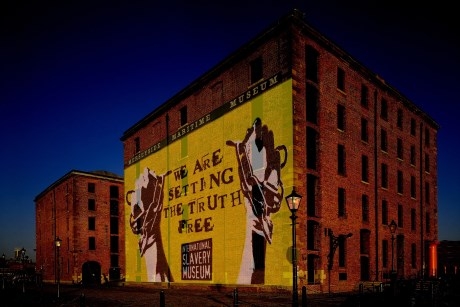The International Slavery Museum in Liverpool explores historical and contemporary slavery and looks at its impact on Africa, South America, the USA, the Caribbean and Western Europe.

Sessions are led by members of the museum’s education team, which means this sensitive subject is approached in an engaging and thoughtful way with links to the curriculum for students in all Key Stages.
Below, STO summarises what students and teachers can expect in a selection of the sessions available at the International Slavery Museum.
Everyday Life in West Africa
This session sees students work in small groups to explore objects and images from the museum’s collection to get an overview of African culture more than 600 years ago before the start of transatlantic slavery.
The session is targeted towards Key Stage 2 classes studying English and History and discussions themed around topics including African Empires, Daily Life, Festivals and Symbols in Art are led by pupils with the guidance of teachers before the hour long session ends with short group presentations.
A Taste of African Music
A Taste of African Music gives pupils the opportunity to play African instruments, such as African drums, shakers, a balaphone and a kora, as well as learn about their importance in African society, what materials are used to make the instruments and how African instruments compare to those found in other parts of the world.
All packed in to 60 minutes, the session, targeted towards Key Stage 2 students, is led by a member of the International Slavery Museum’s education team.
This workshop is available on selected dates in 2017.
Understanding Transatlantic Slavery
From the middle of the 15th century to the end of the 19th century, transatlantic slavery was responsible for the forced migration of between 12 and 15 million people from Africa to the Americas. This session teaches Key Stage 3, 4 and post-16 students about the fundamental aspects of transatlantic slavery and its impact on the lives of those involved.
Through object handling, pupils will discuss subjects such as Traditional Life in West Africa, Forced Migration, Enslavement and Life on the Plantation, Resistance of the Enslaved People and Abolition. The workshop will also look specifically at Liverpool’s involvement in the trade.
Introduction to Human Rights
In this workshop, students are divided into groups to explore five human rights: the right to be treated equally, the right to education, the right to be safe, the right to free speech and the right to play.
Through a range of activities, such as designing a campaign poster, students build an understanding of human rights and how having, or not having them drastically affects lives.
Examples of those who have suffered life without human rights protection, such as Rosa Parks and Malala Yousafzai, as well as the lives of modern day refugees, asylum seekers and survivors of slavery, help to reinforce the importance of human rights to the students.
The Legacies of Transatlantic Slavery
With the use of the museum’s collection of objects, images and written sources on transatlantic slavery, this Key Stage 3 session is designed to encourage students to make links between the aftermath of slavery at the end of the 19th century and the world today.
Topics discussed include Black People in Liverpool, Global Inequalities, America after Slavery, Racism and Stereotyping, and Civil Rights and Activism.
The International Slavery Museum recommends that students have a basic understanding of transatlantic slavery before attending the Legacies of Transatlantic Slavery session.
For more information call 0151 478 4788 or visit www.liverpoolmuseums.org.uk/ism/learning.
Photo credit: Courtesy of National Museums Liverpool.










